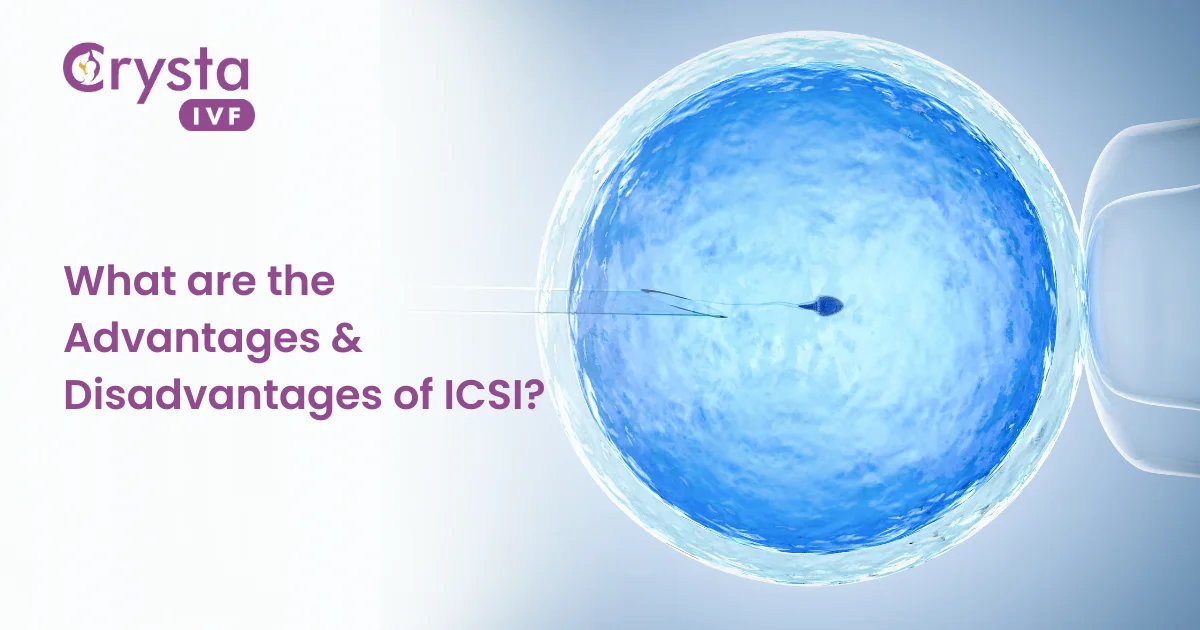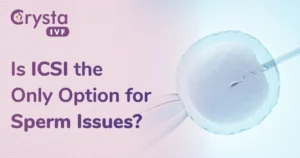For couples dealing with infertility, Intracytoplasmic Sperm Injection (ICSI) has become a popular option, but like any medical procedure, it comes with its own set of pros and cons. Therefore, it’s essential to make an informed decision if you or someone you know is considering this assisted reproductive technology.
No doubt, parenthood is something that every couple wants to experience once in their lives. From limitless joy to wholesome responsibility, carrying your little munchkin can complete your life.
But for some couple, the journey to pregnancy can be challenging. Reproductive complications and miscarriages can make starting a family feel like an impossible dream.
Assisted reproductive technology, specifically ICSI, has been a savior for many infertile couples. However, lack of awareness and incomplete knowledge can make some couples hesitant about undergoing ICSI treatment. If you’re unable to conceive naturally and seeking a solution, we can help.
This blog carries all the vital information associated with ICSI treatment you need to make an informed decision, so let’s get started.
Intracytoplasmic Sperm Injection (ICSI) and why is it performed?
Popularly known as ICSI, intracytoplasmic sperm injection is an advanced assisted reproductive technology dedicated to fertility treatments, specifically in-vitro fertilization.
In this treatment, the sperm is injected directly into the centre of an egg manually with the help of a needle. ICSI treatment is primarily used when couples face male infertility issues
Under what conditions ICSI is done?
Typically ICSI is performed in extreme male infertility conditions, which include:
- Oligospermia or low sperm count
- Asthenozoospermia, or poor motility of the sperm
- Teratozoospermia, or abnormal shape of the sperm
- Retrograde ejaculation
While male infertility appears to be the primary reason for ICSI, it isn’t the only one. Other reasons may include:
- Lack of fertilized egg during prior IVF cycles
- Use of frozen oocytes
- Use of frozen sperm
- Preimplantation genetic diagnosis
- In Vitro maturation
ICSI is a worldwide accepted form of assisted reproductive technology, but in some cases, its usage is considered debatable. Let’s look at the unsettled factors of ICSI throughout the years.
Related Read: Is ICSI treatment Right for You?
What are the associated factors of ICSI that are still in doubt?
The benefits of ICSI are evident in so many situations as one of the best technologies to overcome infertility barriers. However, there are certain cases where success rates are still considered debatable, such as:
Unexplained infertility: In cases of unexplained infertility where no reasons for infertility are determined, ICSI treatment can outshine other methods and become one of the best ways to achieve pregnancy. However, no evidence concludes that live birth or pregnancy rates are improved by ICSI in unexplained infertility cases.
Higher maternal age: There is no proof that age can impact fertility, so going for the ICSI treatment for age-related complications might not be necessary.
Egg retrieved in fewer numbers: When there are fewer eggs, there is a risk that fertilization won’t occur. ICSI can turn out to be an effective option, but it cannot guarantee to improve live birth or pregnancy rates.
The debatable issues arise only in the above-listed cases, and to understand them more in detail, let’s look over the pros and cons of ICSI so that you can make an informed decision.
Pros of ICSI
Increased fertilization rates:
ICSI has significantly increased fertilization rates compared to traditional in vitro fertilization (IVF) methods. ICSI treatment ensures that fertilization results by directly injecting sperm into the egg, bypassing all of the potential barriers that might exist in the path of a successful pregnancy.
Selection of healthy sperm:
ICSI enables an embryologist to attentively choose one of the healthiest-looking sperm for injection into the egg to boost the possibility of creating a viable embryo.
Genetic link preserved:
ICSI allows couples to maintain a genetic link to their newborn, as unlike donor programmes, the eggs and sperm used in ICSI belong to the couples going under treatment.
Overcoming male infertility issues:
ICSI is pivotal and beneficial for couples dealing with male infertility factors, including but not limited to low sperm count, poor sperm motility, or abnormal sperm morphology. With the help of ICSI, even severely compromised sperm can be used for fertilization, thus improving the likelihood of successful conception.
Cons of ICSI
Potential damage to eggs
This delicate process of injecting sperm into the egg carries a minor risk of damaging the egg during the procedure. The aftereffects of this can result in a lower fertilization rate or poor embryonic development.
Limited sperm sample:
ICSI requires a feasible sperm sample, which can be a limitation for individuals with severe male factor infertility. In some cases, if there are no viable sperm in the ejaculate, additional techniques like testicular sperm extraction (TESE) or sperm aspiration may be needed.
Increased risk of genetic abnormalities
ICSI may elevate the risk of genetic abnormalities in offspring compared to natural conception or traditional IVF. However, the absolute risk remains relatively low and is outweighed by the benefits of a successful pregnancy in cases of severe male infertility.
Cost and additional procedures
ICSI treatment is more complex and labor-intensive than traditional IVF, making it more expensive. Furthermore, the need for sperm retrieval techniques like TESE adds to the overall cost of complexity.
ICSI treatment is unquestionably an informed decision in pregnancy failure, ejaculation troubles, and other male infertility problems. This treatment has many advantages for people with fertility issues. It gives a choice to the male partner to use his sperm instead of going for donor sperm.
Moreover, even if the man has undergone a vasectomy, ICSI can also be used. In this condition, healthy sperm will be removed directly from the testicles to inject into the centre of an egg.
In short, ICSI treatment can be a game changer in your life and make you the happiest parent alive. But before making any decision, it is always best to consult a fertility specialist at the top fertility centre in India to know more about your reproductive issues so that whenever you decide to go for ICSI treatment, you can get success in it and start your parenthood journey.


